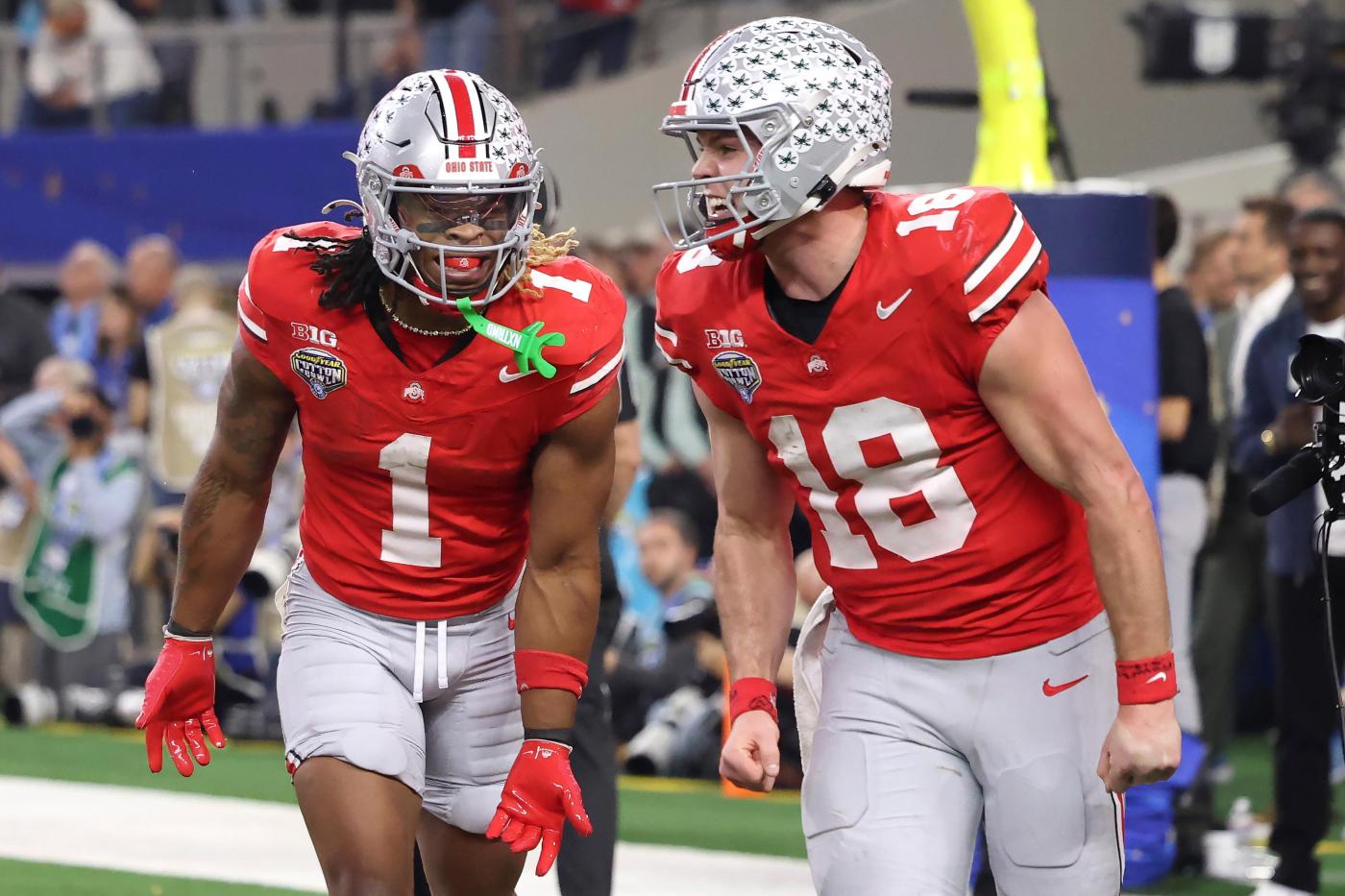As the College Football Playoff world debates proposed formats for 2026 and beyond, the architect of what many consider the nuclear option has remained deafeningly silent.
Big Ten commissioner Tony Petitti, creator and purveyor of the controversial 4-4-2-2-1 model, has yet to explain himself.
Why should the Big Ten and SEC receive four automatic bids to the postseason regardless of their performance during the regular season?
Why should the Big 12 and ACC accept two bids (each) and not attempt to earn more on the field?
Why is predetermined playoff participation good for the sport? How would it benefit ESPN, which is bankrolling the event?
Petitti’s silence stands in contrast to his counterparts:
— Throughout SEC spring meetings last week, commissioner Greg Sankey answered questions (in person and via Zoom) and took intense criticism for his positions on the CFP. The conference’s coaches and athletic directors alike added their perspective to the hottest topic in college sports.
— After Big 12 meetings last week, commissioner Brett Yormark told reporters that he supports the so-called 5+11 model that grants five bids to conference champions and 11 to at-large teams. “I think there’s real momentum, “ he said. “Certainly, the public is voting yes for it.”
— Following the ACC meetings in the middle of May, commissioner Jim Phillips talked of the need for “fairness in the system and access” to the CFP, although he did not dive into specifics.
The Big Ten held similar meetings in May. The low-key affair had no news conference, no Zoom call, no nothing … except radio silence.
Petitti owes the sport, and its fans, an explanation. He’s the face of the conference that proposed a revolutionary change to the most significant event in college athletics. And he’s one of two commissioners, along with Sankey, in possession of codified authority to determine the CFP’s format starting in the 2026 season.
That authority came courtesy of a memorandum of understanding signed last year by the other FBS conferences (and Notre Dame). They were justifiably concerned the Big Ten and SEC, armed with the biggest brands and deepest pockets in the sport, would break away and create their own postseason.
Petitti and Sankey leveraged their way to near-total control, and now Petitti is pushing a format that radically changes the competitive landscape.
Not in eight bajillion years would the NFL guarantee the NFC Central two playoff berths regardless of on-field results.
Why should the Big Ten get four automatic bids?
Petitti’s silence is rapidly turning the conference into the villain — quite an accomplishment given the years-long animosity so many fans have held for the SEC and ESPN.
But Sankey, a creature of college sports, understands the need to include the masses in a process as momentous as determining the format for a 16-team playoff.
Petitti was hired two years ago following a career in sports media and broadcasting. He’s not fully comfortable in the public-facing role, preferring to toil behind the scenes. That approach has earned respect internally. “You know he’s not in this for himself,” one Big Ten campus source said earlier this spring.
Were this any other topic, Petitti’s work in the shadows wouldn’t be so conspicuous. But the CFP is different, and the Big Ten’s proposal is radically different.
That said, the 4-4-2-2-1 model makes all the sense in the world from Petitti’s perspective:
— It allows the Power Four to schedule marquee non-conference games without fear of those losses being held against them by the CFP selection committee and its opaque process. (The Big Ten, in fact, is exploring a crossover series against the SEC.)
— It protects the Big Ten, which plays nine conference games, from being placed at a competitive disadvantage relative to the SEC, which only plays eight, in the selection process. (The SEC is considering a nine-game conference schedule.)
— It allows the Big Ten and SEC to create play-in games on championship weekend with, for example, the No. 3 seed facing the No. 6 seed and No. 4 playing No. 5 — with CFP bids at stake in both. In theory, the play-in games would add value to regular-season matchups that wouldn’t otherwise have playoff implications.
The A-level non-conference games and the play-ins have one thing in common: TV value. They could create new revenue for the conferences as schools prepare to share $20.5 million with athletes.
Related Articles
UConn leads our revised MBB Top 25 after NBA Draft deadline
College football: MW exit notice, CFP chaos, Big 12 cash, Leach’s HOF path
Why June is a vital month in the college football recruiting cycle
Mailbag: Assessing the CFP models and how they benefit the new Pac-12
College football kickoffs: Fox trims B1G Friday, Oregon-Penn St whiteout
The interconnected pieces are best understood if taken in reverse order: To offset the revenue-sharing costs, the conferences need cash. The best way to generate cash? Create new TV inventory. But that new TV inventory would increase the risk of additional losses that could be used against the Big Ten in the selection process. In order to insulate itself from the whims of the committee, the Big Ten wants automatic bids.
Ultimately, Petitti is accountable to the Big Ten presidents and chancellors and no one else. But the public narrative matters in college football. That’s why Sankey, Yormark and Phillips have been out in front.
This is college football. Everyone is motivated by self-interest. The Big Ten is no different from the SEC. It’s just that Petitti’s means to his end is nothing short of revolutionary.
Or, to some, revolting.
Petitti isn’t bound by privacy agreements with his fellow commissioners. Sankey and Yormark have already talked in detail about their preferences and the sentiment on their campuses. It’s time to come clean.
The College Football Playoff isn’t like antitrust settlements or conference realignment or NCAA legislation. ESPN holds the broadcast rights, and the Big Ten and SEC have format control. But it belongs to the public.
An explanation of the 4-4-2-2-1 model — with all the benefits it would bring to the sport for years to come — might win the Big Ten a few converts.
*** Send suggestions, comments and tips (confidentiality guaranteed) to [email protected] or call 408-920-5716
*** Follow me on the social media platform X: @WilnerHotline





